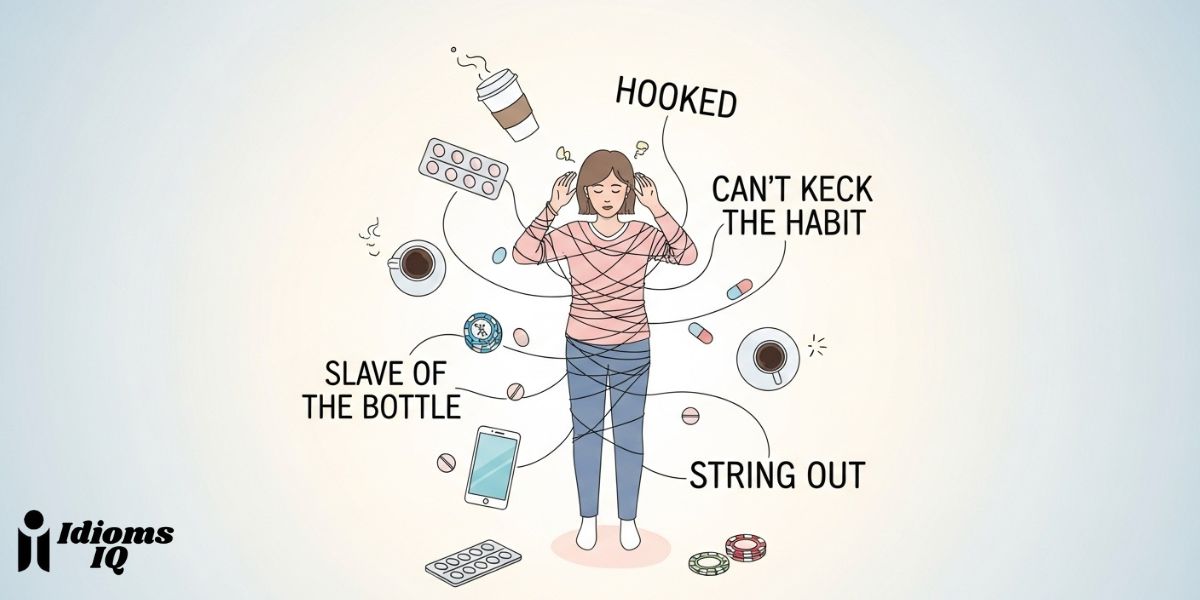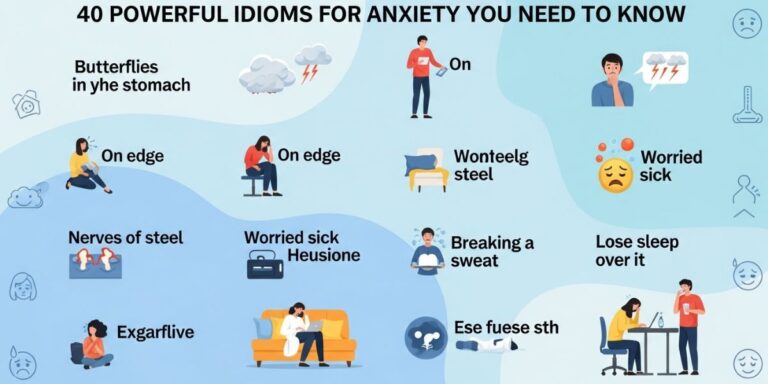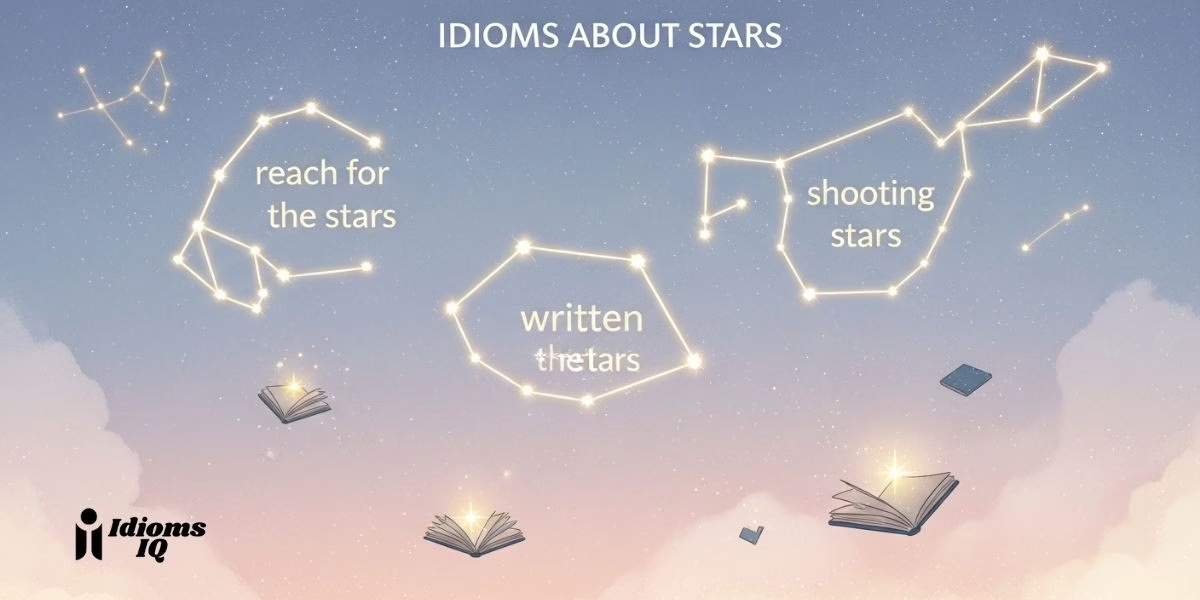
Idioms are the soul of a language, offering us a way to express profound truths and complex feelings that literal words often fail to capture. They are metaphorical keys that unlock deeper layers of meaning, allowing us to connect with each other on a more intuitive level. When discussing a subject as sensitive and multifaceted as addiction, idioms become invaluable tools.
They provide a shared vocabulary to describe the powerful pull of a habit, the feeling of being trapped, or the difficult journey to recovery. Phrases like “chasing the dragon” or “having a monkey on one’s back” paint a vivid picture of the internal struggle, fostering empathy and bringing clarity to an experience that can feel isolating. By exploring these expressions, we not only enrich our language but also open doors to more compassionate conversations.
Addiction often brings anxiety and stress into people’s lives. If you’re exploring emotional idioms, check out our collection of idioms for anxiety that reflect internal struggles.
Idioms for addiction
1. Have a monkey on one’s back
- Meaning: To have a persistent problem or burden, typically a serious addiction.
- Use in a sentence: He’s been trying to get clean for years, but he still has a monkey on his back.
- Other ways to say it: To carry a heavy burden, to be struggling with an addiction, to have a nagging problem.
2. Chasing the dragon
- Meaning: To pursue the initial, euphoric high from a substance, which becomes increasingly elusive with continued use.
- Use in a sentence: He spent years chasing the dragon, always seeking that first feeling he could never get back.
- Other ways to say it: Pursuing an unattainable high, seeking a lost sensation.
3. Hooked on something
- Meaning: To be addicted to something and unable to stop doing, using, or consuming it.
- Use in a sentence: She’s completely hooked on that new video game and plays it for hours every day.
- Other ways to say it: Addicted to, obsessed with, can’t get enough of.
4. At the end of one’s rope/tether
- Meaning: To have run out of patience, options, or strength to cope with a difficult situation, like an addiction.
- Use in a sentence: After another relapse, his family was at the end of their rope.
- Other ways to say it: At one’s wit’s end, at the breaking point, unable to take anymore.
5. Hit rock bottom
- Meaning: To reach the lowest, most desperate point in one’s life, often leading to a decision to change.
- Use in a sentence: He knew he needed help after he hit rock bottom and lost his job and his home.
- Other ways to say it: To reach an all-time low, to be in the depths of despair.
6. A slave to something
- Meaning: To be completely dominated or controlled by something, such as a habit or addiction.
- Use in a sentence: He was a slave to his gambling addiction, spending every dollar he earned.
- Other ways to say it: To be controlled by, to be at the mercy of, to be dominated by.
7. Go cold turkey
- Meaning: To suddenly and completely stop a bad habit or addictive behavior, rather than cutting down gradually.
- Use in a sentence: The doctor advised him to go cold turkey and quit smoking all at once.
- Other ways to say it: To quit abruptly, to stop completely, to give it up suddenly.
8. Fall off the wagon
- Meaning: To relapse; to start drinking alcohol or using a substance again after a period of abstinence.
- Use in a sentence: She was sober for six months, but she fell off the wagon at a party last weekend.
- Other ways to say it: To have a relapse, to break sobriety, to start using again.
9. On the wagon
- Meaning: To be abstaining from alcohol or another substance.
- Use in a sentence: He’s been on the wagon for over a year and feels much healthier.
- Other ways to say it: To be sober, to be abstinent, to be clean.
10. Drown one’s sorrows

- Meaning: To drink alcohol in an attempt to forget one’s problems or sadness.
- Use in a sentence: After he lost his job, he went to the bar to drown his sorrows.
- Other ways to say it: To drink to forget, to use alcohol to cope.
11. A slippery slope
- Meaning: A course of action that seems harmless at first but will likely lead to something much worse or more dangerous.
- Use in a sentence: For him, casual betting was a slippery slope that led to a serious gambling problem.
- Other ways to say it: A dangerous path, a course leading to disaster.
12. Fight one’s demons
- Meaning: To struggle with inner conflicts, personal problems, or addictions.
- Use in a sentence: He has been fighting his demons for years, attending therapy and support groups.
- Other ways to say it: To battle personal issues, to confront one’s inner turmoil.
13. Under the influence
- Meaning: Affected by alcohol or drugs.
- Use in a sentence: He was arrested for driving under the influence.
- Other ways to say it: Intoxicated, drunk or high.
14. One for the road
- Meaning: A final alcoholic drink before leaving a place.
- Use in a sentence: “Let’s have one for the road before we call a taxi,” she said.
- Other ways to say it: A last drink, a final round.
15. Get a fix
- Meaning: To get a dose of a drug that one is addicted to. (Can also be used informally for any strong craving).
- Use in a sentence: He left work early because he needed to get a fix.
- Other ways to say it: To get a dose, to satisfy a craving.
16. Kick the habit
- Meaning: To successfully stop a bad habit or addiction.
- Use in a sentence: It took him several attempts, but he finally managed to kick the habit.
- Other ways to say it: To quit for good, to break the habit, to overcome an addiction.
17. In the grip of
- Meaning: To be completely controlled or dominated by something powerful, like an addiction.
- Use in a sentence: The town was in the grip of an opioid crisis.
- Other ways to say it: Controlled by, dominated by, at the mercy of.
18. A creature of habit
- Meaning: A person who is most comfortable with a familiar routine and dislikes change. This can sometimes relate to addictive patterns.
- Use in a sentence: He’s a creature of habit; he has the same breakfast and reads the same paper every single day.
- Other ways to say it: Set in one’s ways, a person of routine.
19. Down the rabbit hole
- Meaning: To enter a situation that is strange, confusing, and hard to escape from, like the cycle of addiction.
- Use in a sentence: His interest in online conspiracy theories sent him down a rabbit hole he couldn’t escape.
- Other ways to say it: To get lost in something, to enter a bizarre situation.
20. A vicious cycle

- Meaning: A chain of negative events that reinforce each other, making the situation progressively worse.
- Use in a sentence: His depression led to drinking, and the drinking made his depression worse—it was a vicious cycle.
- Other ways to say it: A negative loop, a self-perpetuating problem.
21. Sell one’s soul
- Meaning: To abandon one’s principles or morals for a selfish gain, often to feed an addiction.
- Use in a sentence: He would have sold his soul for another dose.
- Other ways to say it: To compromise one’s values, to do anything for something.
22. Dig one’s own grave
- Meaning: To do something that causes one’s own failure or downfall.
- Use in a sentence: By refusing to get help, he was digging his own grave.
- Other ways to say it: To be the cause of one’s own ruin, to self-destruct.
23. Point of no return
- Meaning: A stage in a process where it is no longer possible to stop or go back.
- Use in a sentence: When she started stealing from her family, she knew she had reached the point of no return.
- Other ways to say it: The Rubicon, a line that has been crossed.
24. A quick fix
- Meaning: A fast and easy solution that is temporary and does not address the root cause of the problem.
- Use in a sentence: Taking pills was just a quick fix for his anxiety; it didn’t solve the underlying issues.
- Other ways to say it: A temporary solution, a band-aid solution.
25. Tied to one’s apron strings
- Meaning: To be dependent on or controlled by someone, like a child to a mother. This can describe enabling relationships in addiction.
- Use in a sentence: He’s 30 but still tied to his mother’s apron strings, relying on her to solve all his problems.
- Other ways to say it: To be dependent on, to be controlled by someone.
26. Lead someone astray
- Meaning: To encourage someone to behave badly or immorally.
- Use in a sentence: The older kids led him astray, introducing him to drugs and alcohol.
- Other ways to say it: To be a bad influence on, to corrupt someone.
27. Burn the candle at both ends
- Meaning: To work or live at a frantic pace, often involving late nights and early mornings, which can lead to burnout or reliance on stimulants.
- Use in a sentence: She was burning the candle at both ends, working two jobs and partying all night.
- Other ways to say it: To overwork oneself, to live unsustainably.
28. A crutch
- Meaning: Something that a person depends on excessively for support or comfort.
- Use in a sentence: He used alcohol as a crutch to deal with his social anxiety.
- Other ways to say it: A coping mechanism, a support system (often unhealthy).
29. Take a nosedive
- Meaning: To decline or worsen rapidly.
- Use in a sentence: His health took a nosedive after he started using heavily again.
- Other ways to say it: To go downhill fast, to plummet, to deteriorate quickly.
30. In a haze/daze

- Meaning: In a state of confusion or disorientation, often due to substance use.
- Use in a sentence: He wandered through the day in a haze, barely aware of his surroundings.
- Other ways to say it: In a stupor, disoriented, confused.
31. A downward spiral
- Meaning: A situation that gets progressively worse and is difficult to escape.
- Use in a sentence: After losing his job, he fell into a downward spiral of depression and addiction.
- Other ways to say it: A steady decline, a worsening situation.
32. Out of one’s mind/head
- Meaning: To be irrational, crazy, or intoxicated.
- Use in a sentence: You must be out of your mind to think that’s a good idea.
- Other ways to say it: To be crazy, irrational, not thinking clearly.
33. Drink like a fish
- Meaning: To drink excessive amounts of alcohol habitually.
- Use in a sentence: He drinks like a fish every weekend.
- Other ways to say it: To be a heavy drinker, to drink excessively.
34. Wallow in self-pity
- Meaning: To indulge in excessive sadness and feel sorry for oneself, which can be a barrier to recovery.
- Use in a sentence: Instead of seeking help, he preferred to wallow in self-pity.
- Other ways to say it: To feel sorry for oneself, to indulge in misery.
35. The hair of the dog
- Meaning: An alcoholic drink taken to cure a hangover.
- Use in a sentence: He felt terrible this morning, so he had a “hair of the dog” to feel better.
- Other ways to say it: A morning-after drink, a hangover cure.
36. Living on the edge
- Meaning: To live a life with many risks and dangers, often associated with addictive lifestyles.
- Use in a sentence: He gets a thrill from living on the edge, never knowing what tomorrow will bring.
- Other ways to say it: To live dangerously, to take many risks.
37. A lost cause
- Meaning: Someone or something that is hopeless and cannot be helped.
- Use in a sentence: His family began to feel he was a lost cause after so many failed attempts at rehab.
- Other ways to say it: Hopeless, beyond help, a futile case.
38. Throw caution to the wind
- Meaning: To act recklessly and without concern for the consequences.
- Use in a sentence: He threw caution to the wind and spent all his savings on a single bet.
- Other ways to say it: To be reckless, to act without thinking.
39. In denial
- Meaning: Unwilling to accept that something unpleasant or true is happening.
- Use in a sentence: She is in denial about the seriousness of her son’s addiction.
- Other ways to say it: Refusing to see the truth, unable to accept reality.
40. Turn over a new leaf

- Meaning: To start behaving in a better way; to make a fresh start.
- Use in a sentence: After getting out of jail, he promised to turn over a new leaf.
- Other ways to say it: To make a fresh start, to change for the better.
Fill-in-the-Blank Exercise
Complete the following sentences with the correct addiction idiom from the list above.
- After his relapse, he felt like he had completely ______________________.
- She’s been ______________________ for a year and has never felt better.
- His gambling started casually, but it became a ______________________ that led to ruin.
- He needs to stop using alcohol as a ______________________ for his problems.
- After losing everything, he finally ______________________ and decided to get help.
- He has been trying to ______________________ for years, but it’s incredibly difficult.
- She decided to ______________________ and quit her caffeine habit all at once.
- His parents worry that his new friends will ______________________.
- He’s completely ______________________ on social media, checking it every few minutes.
- The family felt they were ______________________ and didn’t know how to help him anymore.
- He’s been trying to get rid of the ______________________ for a long time.
- Using painkillers to manage stress can create a ______ ______________________.
- After his recovery, he was determined to ______________________.
- She was completely ______________________ of her shopping addiction.
- He knew that one drink would lead to another, so he avoided that first step on the ______________________.
Answer Key
- fallen off the wagon
- on the wagon
- downward spiral
- crutch
- hit rock bottom
- kick the habit
- go cold turkey
- lead him astray
- hooked
- at the end of their rope
- monkey on his back
- vicious cycle
- turn over a new leaf
- in the grip
- slippery slope
Conclusion
Language is a powerful tool for connection and healing. By learning and using idioms related to difficult subjects like addiction, we equip ourselves to communicate with more empathy and precision. These phrases allow us to articulate the nuances of a struggle, making abstract feelings more concrete and relatable.
Practicing their use not only enhances our writing and conversational skills but also builds our emotional intelligence. It enables us to better understand the metaphors others use to describe their experiences and to express our own support and understanding in a way that is both sensitive and profound. Ultimately, a richer vocabulary can help bridge the gap between isolation and connection.






